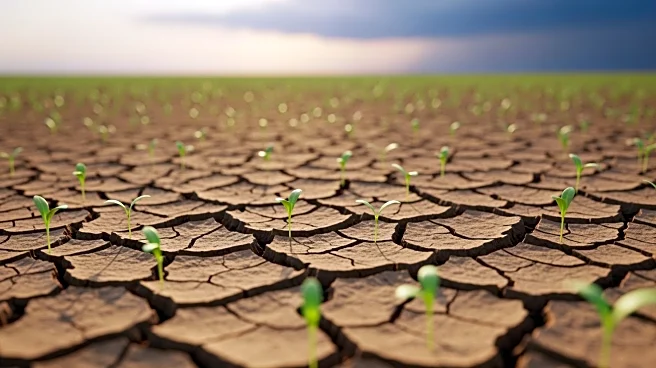What's Happening?
The agriculture sector in Jamaica is facing significant financial challenges following the devastation caused by Hurricane Melissa. Agriculture Minister Floyd Green has announced that the repair costs are expected to exceed J$50 billion. The World Bank's
rapid assessment estimated the damage at approximately $60 billion, though the final figure may be slightly lower. The hurricane, a Category 5 storm, caused widespread damage across various parishes, including St. Catherine, which reported losses despite not being directly hit. The damage has affected multiple crop lines and livestock, necessitating a substantial recovery effort. Minister Green emphasized the resilience of Jamaican farmers and fishers, who are actively working to salvage their fields and continue operations. The government plans to support recovery efforts by distributing seeds for major vegetable lines and providing land preparation assistance, including the deployment of walk-behind tractors and augers to aid farmers in mountainous areas.
Why It's Important?
The financial impact of Hurricane Melissa on Jamaica's agriculture sector is profound, with potential consequences for the country's economy and food security. The estimated $50 billion recovery bill highlights the scale of the damage and the resources required for rebuilding. Agriculture is a vital component of Jamaica's economy, providing employment and sustenance for a significant portion of the population. The government's commitment to supporting farmers through seed distribution and equipment provision is crucial for accelerating recovery and ensuring the sector's resilience. The situation underscores the importance of disaster preparedness and the need for robust infrastructure to withstand extreme weather events. The recovery efforts will not only aid in restoring agricultural productivity but also contribute to the overall economic stability of the region.
What's Next?
The Jamaican government is set to commence the dissemination of seeds for regrowing major vegetable lines, which is a critical step in the recovery process. Additionally, land preparation support will be provided starting next week, with the introduction of walk-behind tractors and augers to assist farmers in mountainous areas. These efforts aim to enhance efficiency and address labor challenges faced by farmers. The government is focused on accelerating the pace of recovery by providing necessary resources and support to the affected communities. Continued collaboration with international organizations like the World Bank may be essential in securing further aid and expertise to bolster recovery initiatives.
















